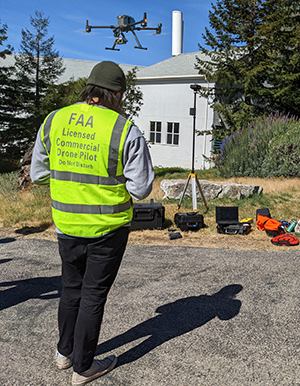Campus News
CITRIS drone program lands $1 million grant from James Irvine Foundation
The UC Santa Cruz CITRIS Initiative for Drone Education and Research (CIDER) along with several partners has received a $1 million, 15-month planning grant to support regional drone education and workforce development from The James Irvine Foundation.

The UC Santa Cruz CITRIS Initiative for Drone Education and Research (CIDER) along with several partners has received a $1 million, 15-month planning grant to support regional drone education and workforce development from The James Irvine Foundation. They will use the funds to develop a program that provides valuable drone pilot skills, certification, and field experience that lead to employment for students in the underserved Salinas and Pajaro Valley regions.
CIDER is a program within CITRIS and the Banatao Institute at UCSC that brings together students and stakeholders to develop a diverse drone workforce. The grant is shared with university partners at the Institute for Social Transformation and the MESA program, and external partners, Hartnell College and Digital Nest.
“This generous grant will allow us to deepen our ties with our partners in Salinas and the Pajaro Valley,” UCSC Chancellor Cynthia Larive said. “It’s a wonderful opportunity to share the transformational power of a UC Santa Cruz education, providing critical and tangible workforce development skills for a growing industry.”
The planning grant will allow the partner organizations, under the leadership of CIDER Director Becca Fenwick and Associate Director Justin Cummings, to develop a program that will target communities historically underserved and underrepresented in STEM. It will establish an educational and training pathway for students as well as new and incumbent workers in the Salinas and Pajaro valleys. The James Irvine Foundation has identified Salinas as one of its priority cities and is supporting community-based programming to develop an economy that works for all residents in the region.
“To achieve our vision of an economy that works for all residents, the Priority Communities initiative supports local efforts to create good jobs and more equitable economies. We are thankful for the critical leadership, partnership, and collaboration between UC Santa Cruz CITRIS CIDER, Hartnell College, and Digital Nest,” said The James Irvine Foundation Priority Communities Initiative Director, Jessica Kaczmarek. “This is a key opportunity to support the expansion and diversification of quality drone-related employment and access to those jobs for the residents of the Salinas Valley and Pajaro Valley.”
Aerial drone technology has experienced explosive innovation in the past five years. This innovation has reduced the cost of drones and increased their use in many key local industries, including agriculture, construction, forestry and conservation. Drones have also become a transformative factor in scientific research, revolutionizing the means of data acquisition and types of data available to researchers in many fields.
“It is wonderful to see that, thanks to the generous support from partners like The James Irvine Foundation, our focus on diversity, equity and inclusion in CITRIS and CIDER in particular is resulting in such great opportunities to serve communities that are underserved and underrepresented in STEM,” said JJ Garcia-Luna-Aceves, Campus Director of CITRIS and the Banatao at UC Santa Cruz.
As a result of the expanding application of drone technology, there is increasing demand for skilled operators. Black, indigenous, and people of color (BIPOC) and women have been historically excluded from science, engineering, technology and math (STEM) fields and careers. So, with the expansion of drone applications, it is essential that training opportunities target communities historically excluded from STEM so they can apply these skills in their current professions, find new opportunities, and help increase diversity in this emerging workforce.
“We at Hartnell are enormously grateful for our partnership with UC Santa Cruz and the support of The James Irvine Foundation,” said Erica Padilla-Chavez, president of the Hartnell Community College District Governing Board. “It’s crucial that our students understand how drones work and be ready to apply their many benefits in a wide variety of STEM-related careers, especially within the Salinas Valley ag industry.”
Digital NEST will collaborate with CIDER to offer high school aged youth from our Watsonville, Salinas and Gilroy locations a high quality experience focused on an experiential STEM curriculum that includes hands-on engineering concepts and done operations. Additionally, the Digital NEST will have access to college aged role models and peer mentors.
“We are excited to be in partnership with UCSC to provide our youth exposure to the many opportunities Drone specialized careers can offer, especially for our youth who are interested in initiating their professional careers close to home, contribute to the local economy, and strengthen their community,” commented Dr. Antonia O. Franco, Chief Operating Officer of Digital Nest.
The connection to The James Irvine Foundation and the many partner organizations that led to this grant was facilitated by the new UCSC Innovation and Business Engagement Hub, a valuable campus-wide resource for connections to potential industry partners and supporters.
The CIDER program at UCSC provides guidance and leadership around the use of drones on campus in a variety of ways. They coordinate research opportunities and support data acquisition for campus researchers across disciplines. Diverse student cohorts have the opportunity to master the operation of drones and associated sensors through various programs put on by CIDER, and those students are supported in the completion of their FAA Part 107 commercial drone pilot certification.
The program also works to foster professional development through employment opportunities for students by working with industry partners to provide internship and employment opportunities. They also secure contracts with both campus and external organizations to fly drone missions, which provide students with paid field training opportunities.